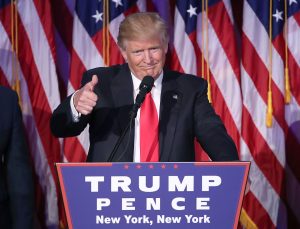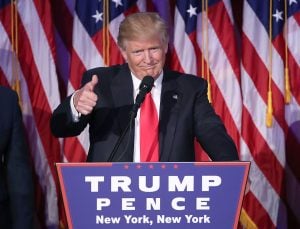
(Photo
by
Mark
Wilson/Getty)
Donald
Trump’s
latest
effort
to
wriggle
out
of
liability
for
defaming
advice
columnist
E.
Jean
Carroll
met
the
same
fate
as
all
the
others,
with
Judge
Lewis
Kaplan
rejecting
his
motion
for
summary
judgment
and
refusing
to
allow
him
to
make
a
belated
argument
of
absolute
presidential
immunity
from
civil
suit.
In
the
pantheon
of
grumpy
Lew
Kaplan
orders,
this
one
hardly
charts.
But
it
does
convey
the
court’s
exhaustion
with
the
plaintiff
and
his
counsel
Alina
Habba
after
three
years
of
dilatory
maneuvers
and
shambolic
lawyering
across
two
lawsuits.
Faced
with
the
same
category
error
confusing
libel
per
se
and
slander per
se,
the
court
simply
quotes
its
own
ruling
from
Carroll
II
disposing
of
the
argument.
He
merely
sighed
at
Trump’s
argument
that
his
2019
statement,
virtually
indistinguishable
from
the
2022
claims
a
jury
just
found
him
liable
for,
was
a
non-defamatory
statement
of
opinion.
And
he
simply
bats
away
Trump’s
claim
that
Carroll
consented
to
be
defamed
by
dint
of
accusing
a
famous
man
of
sexual
assault.
Ms.
Carroll’s
generalized
concern
that
she
might
be
subject
to
the
same
attacks
that
other
women,
as
she
stated,
have
experienced
after
coming
forward
with
their
accusations
against
Mr.
Trump
does
not
demonstrate
her
awareness
of
and
agreement
to
the
possibility
that
Mr.
Trump
might
defame
her
in
response
to
her
specific
accusation
of
sexual
assault
and
rape.
But
Judge
Kaplan
did
manage
to
work
himself
into
his
usual
cantankerous
lather
over
Trump’s
untimely
effort
to
invoke
presidential
immunity.
The
court
first
quotes
Trump’s
motion
for
summary
judgement,
in
which
he
argued
that,
as
president,
he
simply
had
to
assure
the
public
that
Carroll
was
a
dirty
liar:
As
both
the
leader
of
the
nation
and
head
of
the
Executive
Branch,
[he]
could
not
sit
idly
while
a
‘media
frenzy’
erupted
around
allegations
that
attempted
to
paint
him
as
a
rapist.
Indeed,
faced
with
this
widely-reported,
unprovoked
attack
on
his
character,
the
President
had
a
duty
to
respond;
at
a
minimum,
this
action
was
necessary
to
‘maintain
the
continued
trust
and
respect
of
[his]
constituents’
and
to
‘preserve
his
ability
to
carry
out
his
[]
responsibilities.’
.
.
.
Thus,
it
cannot
be
reasonably
disputed
that
[Mr.
Trump’s]
conduct
was
‘presidential’
in
nature
because
he
was
addressing
an
issue
of
grave
public
concern
that
weighed
on
the
character
and
competency
of
the
leader
of
the
nation.
But
the
court
will
not
be
opining
as
to
whether
the
people
have
got
to
know
whether
or
not
their
President
is
a
crook,
for
the
simple
reason
that
“their
President”
didn’t
raise
this
defense
when
he
was
sued
in
2019,
nor
when
he
left
office
in
2021,
hoping
by
then
that
the
Second
Circuit
or
DC
Court
of
Appeals
would
rule
that
Trump
was
acting
within
the
scope
of
his
official
duties
and
disappear
the
case
under
the
Westfall
Act.
Only
when
that
failed
did
Trump
make
the
executive
immunity
argument,
insisting
that
he
could
not
have
waived
it
during
the
intervening
four
years
because
presidential
immunity
is
unwaivable
as
a
matter
of
separation
of
powers,
depriving
the
court
of
subject
matter
jurisdiction.
Scoffing
at
the
“patronizing”
claim
that
courts
have
the
ability
to
strip
the
executive
of
his
right
to
waive
immunity,
the
court
restates
its
prior
finding
that
Trump
and
his
counsel
have
acted
in
“dilatory”
fashion
throughout
the
proceeding.
“There
is
no
basis
to
risk
prolonging
the
resolution
of
this
litigation
further
by
permitting
Mr.
Trump
to
raise
his
absolute
immunity
defense
now
at
the
eleventh
hour
when
he
could
have
done
so
years
ago,”
Judge
Kaplan
writes,
noting
that,
if
given
leave
to
amend,
Trump
will
be
able
to
postpone
reckoning
yet
further
through
another
round
of
appeals.
The
undue
delay
in
asserting
the
defense
thus
was
inherently
and
unfairly
prejudicial
even
if
this
Court
is
mistaken
in
concluding
that
it
is
legally
insufficient.
Finally,
there
is
the
one
more
consideration.
If
Mr.
Trump
were
granted
leave
to
amend
and
this
Court
were
to
reject
his
absolute
immunity
claim,
the
order
doing
so
likely
would
be
appealable.
No
doubt
Mr.
Trump
would
appeal.
And
an
appeal
likely
would
cause
“significant
additional
delays
in
this
litigation
arising
from
a
defense
that
Trump
chose
not
to
assert
for
the
first
three
years
of
the
proceedings.
In
the
end,
the
entire
46-page
order
could
have
been
reduced
to
a
single
sentence
on
page
three:
“His
arguments
are
without
merit.”
Or,
as
Carroll’s
lawyer
Roberta
Kaplan
put
it,
“Judge
Kaplan’s
denial
of
summary
judgment
confirms
that
once
again,
Donald
Trump’s
supposed
defenses
to
E
Jean
Carroll’s
defamation
claims
don’t
work.
Trump
chose
to
waive
presidential
immunity
and
now
he
must
live
with
the
results
of
that
decision.”
Carroll
v.
Trump
I [Docket
via
Court
Listener]
Carroll
v.
Trump
II [Docket
via
Court
Listener]
Liz
Dye lives
in
Baltimore
where
she
writes
about
law
and
politics
and
appears
on
the Opening
Arguments podcast.

